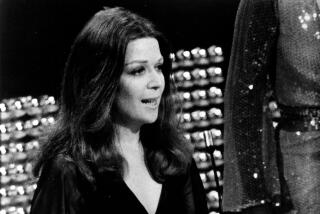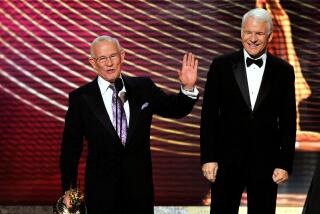Mary and Dick - Shows of Their Very Own : Van Dyke Back at the Laugh Stand
- Share via
On one side of CBS’ “The Van Dyke Show” stood an icon of ‘60s TV. On the other, an executive producer who was in diapers when Rob Petrie first tripped over the footstool in his suburban New Rochelle living room.
Both sides say there was definitely a generation gap.
“I have absolutely no clue as to what he was looking for, but he obviously didn’t find it,” said Donald Todd. The 28-year-old was fired as executive producer of the new show after he and star Dick Van Dyke clashed over the direction and style of the series that premieres tonight at 8 on Channels 2 and 8.
“The fact that comedy has changed over the years is evident, and he seemed more comfortable with something he had done before,” Todd continued. “It was my intention to do something he had not done before. I suppose that’s where we parted.”
Dick Van Dyke, 62, was the man responsible for dismissing Todd.
“Don Todd is 28 years old--I have four kids older than that,” Van Dyke said in a recent interview, an ever-so-slight displeasure ruffling his polished, smiling demeanor. “He is a very talented young man, he has a very bright future--but he was talking to an old horse here. He was (a baby) in 1961, the year ‘The Dick Van Dyke Show’ went on the air. I had to tell him what I did.
“It was just a bad mix, and the generational gap was not the least of the problems.”
“The Van Dyke Show” is the story of stage-and-screen star Dick Burgess, who chucks a Broadway offer and a successful career in Hollywood for the chance to become re-acquainted with his son Matt (played by his real son, Barry Van Dyke) and Matt’s family by becoming his partner in a struggling regional theater in Pennsylvania.
But the show about the generation gap between father and son also hit a snag during production--when producer Todd’s half-drama, half-comedy writing style went up against more than 25 years of broad Van Dyke TV comedy tradition-- and lost.
In an interview last week at the Culver Studio offices that house the show’s production company, GTG Entertainment, Van Dyke said that he and Todd “made every effort to communicate.
“He has a beautiful way of writing, but I just said to him: ‘Dick Van Dyke is not this kind of performer.’ ”
Prior to last summer’s Writers Guild of America strike, the pilot “Van Dyke” episode, written by Todd, was scrapped. Both Todd and Van Dyke agreed that the pilot needed redoing: “I learned in the first pilot that I could be funny in a lot of different ways than I was trying to be,” Todd said. “A little lighter--no, much lighter--and a little broader, without being stupid.”
Todd thought he had accomplished that lighter touch in his subsequent scripts, but Van Dyke apparently didn’t. Those scripts were also scrapped, Todd was fired, and Van Dyke brought in two new executive producers, Sam Bobrick and Ron Clark, veteran writers of the original “Smothers Brothers Comedy Hour,” “Get Smart” and “The Tim Conway Show.” (Todd remains at GTG developing new projects.)
Before Todd left the show, the role of Barry Van Dyke’s on-screen wife was recast and rewritten: The original, played by Gwynyth Walsh, was a sophisticate stuck in a small town, yearning to move back to Chicago (the Barry Van Dyke character has given up an advertising career to run the theater). The cheery new wife, played by Keri Lizer, is happy with the simple life.
The pilot, set mostly in the theater, played up the conflict between the elder Burgess’ musical-comedy roots and his son’s desire to present serious theater, as well as the son’s bitterness toward his absentee father. The new show is decidely lighter, more family-oriented fare.
The new producers also added a grandson for Dick Burgess: a chubby blond karate enthusiast portrayed by Billy O’Sullivan, and one new staffer at the theater, a 16-year-old aspiring actor (Paul Scherrer), who joins original cast members Maura Tierney as the girl in the ticket booth and Whitman Mayo as the elderly janitor with the bone-dry wit.
“(The original) just wasn’t that heavy on comedy, and I think CBS wanted a comedy show; that’s what they were buying Dick for,” said executive producer Clark. “Dick is very happy, because now he’s doing what he does best.”
“I’m completely dissatisfied with it,” Todd said of the new show. He describes the new Keri Lizer character as having a “June Cleaver quality” rather than being the “woman of the ‘80s” he had envisioned. “But that’s what happens when a different writer takes over somebody else’s characters. There’s no similarity to what I created. Whether that’s good or bad, I’m not qualified to judge. I hope the audience likes what they see.”
The new producers also plan to include more of the physical humor that made Van Dyke--a former mime--a legend in “The Dick Van Dyke Show,” created by Carl Reiner.
Van Dyke himself worries a little about that. “That’s kind of something I’ve been pressured into,” he acknowledged. “I don’t know whether that’s contemporary, or whether I’ll fall into what happened to Lucy (Lucille Ball, who two years ago made an unsuccessful slapstick comeback in a new series when in her 70s). That made me so mad, when she came back and they all said that to see her do it when she’s old is not so good.
“That could happen to me--a white-haired old guy is not so funny,” Van Dyke said. “And it’s funny, people don’t seem to realize that because Carl Reiner is such a genius, the physical thing was used very, very sparingly. It was never injected into the show unless it was part of the story.”
Van Dyke also worries that America may not be interested in theater as a subject for a sitcom, but says the writers will only use the theater as a backdrop.
“It’s similar to the original show that I did with Mary (Tyler Moore) and Carl,” he said. “It was about a television writer, but only 20% or 25% of the shows were about making the television show.”
Van Dyke remains philosophical about the inevitable comparisons he expects between the 1960s series and his new one. The fact that Moore, veteran of the Emmy-winning “Mary Tyler Moore Show,” stars in a show directly following his will double the chances of comparisons to past successes.
“At least at the beginning, there will be some curiosity that might get us an audience,” Van Dyke said. “People will want to look in on us, anyway. You really have to ignore comparisons. Being on before Mary puts an onus on me, because if I don’t deliver a rating, she’s going to be mad. I kept telling CBS to put her on first.”
The pairing might also conjure up memories of past failures, such as Moore’s two “Mary” series. Moore starred in a 1978 CBS comedy-variety “Mary” series that lasted just three weeks. She tried a sitcom “Mary” again in 1985-86--about a consumer advocate on a slightly sleazy Chicago tabloid. The series premiered in December and died in April.
“You know, I liked that series,” Van Dyke mused. “But it just goes to show that name value doesn’t mean anything if your show isn’t entertaining.”
More to Read
The complete guide to home viewing
Get Screen Gab for everything about the TV shows and streaming movies everyone’s talking about.
You may occasionally receive promotional content from the Los Angeles Times.






